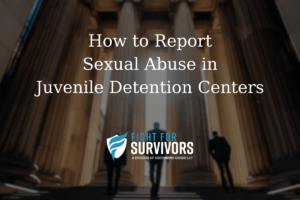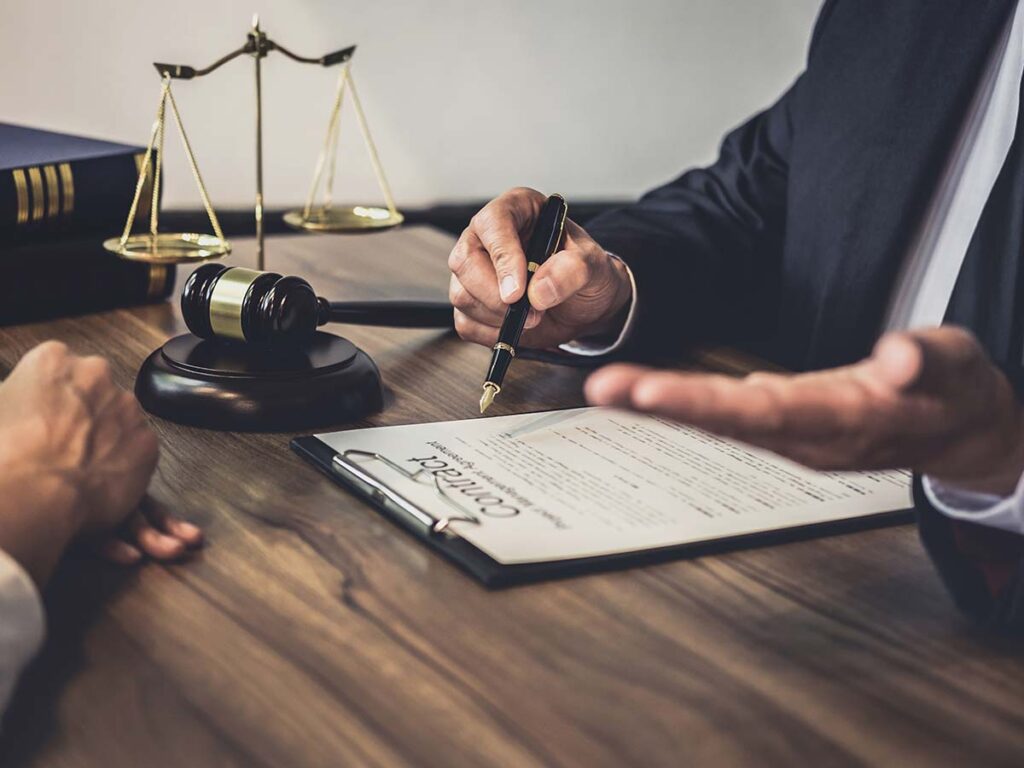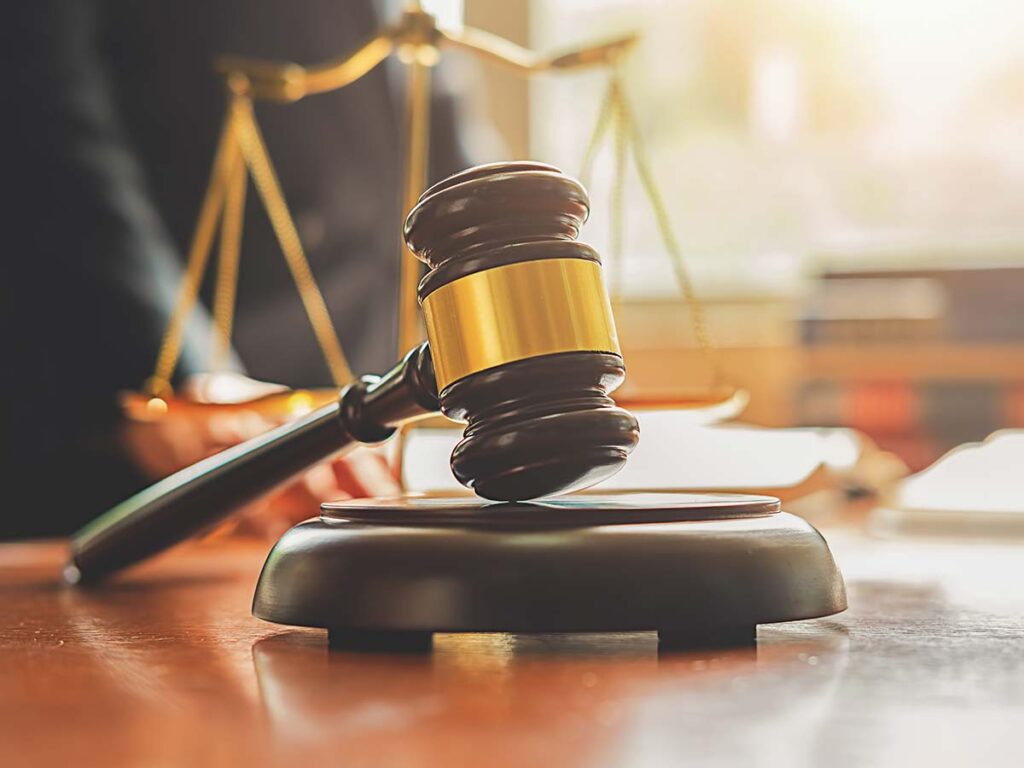
Sexual abuse in juvenile detention centers is a serious, ongoing issue that has affected thousands of incarcerated youth across the United States. These facilities are supposed to provide rehabilitative environments, not places where children are subjected to harm. Yet many youth committed to these institutions experience sexual assault, harassment, and exploitation at the hands of staff members, other detainees, or through systemic neglect.
If your child—or someone you know—has been sexually abused in a juvenile facility, it’s critical to understand your legal rights, how to report the abuse, and what support systems are available. Reporting these incidents not only helps survivors but also plays a vital role in reforming an often abusive system.

Understanding the Scope of the Problem
Contact Us For A Free Legal Consultation. No Fee.
Call (833) 55-FIGHTIn recent years, growing national attention has exposed the extent of sexual abuse in juvenile detention. According to reports issued under the Prison Rape Elimination Act (PREA), youth in juvenile facilities are at significantly higher risk of sexual victimization compared to adults in adult prisons.
Many of these children experience sexual misconduct from the very people charged with protecting them: guards, housing supervisors, and other staff. Others are harmed by fellow detainees in environments lacking proper supervision. In some cases, the abuse is part of a broader pattern involving physical abuse, threats, and coercion.
Despite these realities, many incidents go unreported. Children may fear retaliation, isolation, or being ignored. Others don’t recognize that what happened to them was abuse. The justice system is slowly evolving to better support child victims—but we have a long way to go.
Common Forms of Sexual Abuse in Juvenile Facilities
Sexual abuse in juvenile detention can take many forms, including:
- Sexual assault by staff or peers
- Coercive sexual activity
- Grooming or inappropriate contact
- Harassment, threats, or exposure to pornography
- Use of authority or manipulation to force compliance
These acts often occur in areas where supervision is limited, or where staff have unchecked access to isolated youth. Facilities are required under PREA to prevent and respond to these incidents, but too many fail to meet even minimum standards.
How to Report Sexual Abuse in Juvenile Detention Centers
Reporting abuse is difficult, especially when the survivor is a child in custody. Still, there are several critical pathways you or your attorney can take to initiate accountability.
1. Internal Reporting Within the Facility
Many juvenile detention centers have internal processes in place to report abuse. This could involve submitting a written report or complaint to the facility’s administrator or designated PREA coordinator. Some centers provide hotlines or locked boxes for youth to disclose abuse.
While internal reporting may be the first step, it’s often not sufficient—especially if facility leadership is complicit or unresponsive. Families should always pursue additional steps outside the facility.
2. Contact External Oversight Agencies
You can file a report with a number of state and federal oversight bodies:
- State juvenile services or department of corrections
- State ombudsman offices or child advocacy agencies
- The U.S. Department of Justice or civil rights division
- The facility’s PREA audit authority
- Child protective services (CPS)
Filing a report with these agencies ensures there is documentation outside the facility and that additional eyes are on the situation.
3. Call the National Sexual Assault Hotline
The National Sexual Assault Hotline, operated by RAINN, is available 24/7 at 1-800-656-HOPE (4673). They provide free, confidential support and can connect families and survivors with local resources, therapists, and legal referrals. If the survivor wants to remain anonymous, they can choose to do so.
The hotline also assists in finding safe, trauma-informed professionals who understand how to work with youth and survivors of institutional abuse.
4. File a Legal Complaint or Lawsuit
If the facility or its staff failed to protect your child or were directly involved in the abuse, you may be able to pursue a lawsuit. Civil lawsuits are often filed against:
- The individual abuser (staff member or detainee)
- The juvenile facility or agency for negligence
- Supervisors or government agencies that failed to act
Attorneys experienced in child sexual abuse cases and institutional abuse can help you build a case and protect your child’s rights. Legal action may result in monetary compensation and systemic reforms within the facility.

Legal Protections and the Role of Federal Law
Several federal and state laws offer protection and support for youth who have been abused in custody:
Prison Rape Elimination Act (PREA)
PREA was enacted to reduce sexual violence in correctional facilities, including juvenile centers. It requires facilities to train staff, report allegations, protect victims, and audit compliance. While not all facilities fully comply, PREA can be a powerful tool for reporting and triggering investigations.
Child Victims Act
In states that have passed Child Victims Act laws, survivors of child sexual abuse may file lawsuits beyond traditional statute limitations. These laws were designed to support child victims who were previously silenced or unaware of their rights. Maryland and other states have proposed or passed versions of these acts.
Why Reporting Matters
When children are abused while in state custody, they often feel powerless and forgotten. Reporting these crimes sends a clear message that abuse will not be tolerated—and that survivors matter. It also creates a paper trail that can help others come forward, influence legislation, and force changes in dangerous or negligent juvenile facilities.
Advocacy groups, attorneys, and survivors themselves are working hard to expose abuse and dismantle the systems that enable it. Organizations like the Sentencing Project and various state-level watchdog groups help amplify these stories and push for policy change.
Support Resources for Survivors and Families
Survivors of sexual abuse in custody need extensive support to begin their healing. The trauma of institutional abuse runs deep and is often compounded by isolation, shame, or disbelief.
Families and survivors may benefit from:
- Counseling with trauma-informed therapists
- Legal consultations with attorneys familiar with institutional abuse
- Advocacy through local nonprofits or national organizations
- Calling the National Sexual Assault Hotline for immediate support
You Are Not Alone
Sexual abuse in California juvenile detention centers is not a private failure—it’s a public and systemic one. Families have the right to demand accountability, safety, and justice for their children. Whether through legal action, advocacy, or reporting mechanisms, your voice matters.
If your child has been harmed while in custody, take that next step. Reach out. File a report. Speak to an attorney. Healing begins with being heard—and justice begins with action.
Frequently Asked Questions
Can I sue a juvenile detention center for sexual abuse?
Yes. If your child was abused while in state custody, you may have the right to file a lawsuit against the abuser and the facility. Speak with an attorney to understand your options.
How do I report abuse if my child is still in custody?
You can file reports with state juvenile services, call the National Sexual Assault Hotline, or report to the Department of Justice. Always document everything and maintain copies of communications.
What protections exist for my child after reporting?
PREA requires facilities to separate victims from abusers and to provide support. Unfortunately, compliance varies. Ongoing advocacy and legal support can help enforce these protections.
What if the abuse happened years ago?
You may still be able to file a lawsuit, especially if your state has a Child Victims Act or extended statute of limitations. These laws were created to allow survivors to come forward even decades later.
Will my child have to testify?
In many cases, survivors can provide written statements or testify in closed proceedings. A trauma-informed attorney can help navigate this process and protect your child’s well-being.
Experienced Attorneys Who Will Listen And Fight For You
Speak To An Attorney Now »